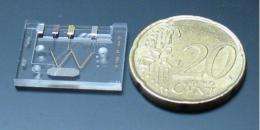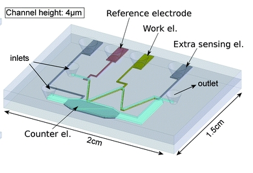Photograph and diagram of the chip showing the inlets and outlets for fluids, the W-shaped fluid channel and the different electrodes.
(PhysOrg.com) -- A tiny electrochemical cell, developed by researchers of the MESA+ Institute for Nanotechnology, The Netherlands, is able to mimick the behaviour of medicine inside a human body. This chip is presented in the journal Lab on a Chip.
How a medicine reacts in the body to form different substances can now be simulated in a special fluidic chip developed at the University of Twente. This miniaturized electrochemical cell enables the rapid screening of new medicines. Researchers at the UT’s MESA+ Institute for Nanotechnology presented the chip in the international authoritative journal ‘Lab on a Chip’.
Photograph and diagram of the chip showing the inlets and outlets for fluids, the W-shaped fluid channel and the different electrodes.
The chip is an extremely small electrochemical cell: a cell in which the chemical reactions that take place in the human body are simulated. The volume of the most important fluid channel on the chip is only 9.6 nanolitre, a nanolitre being a billionth of a litre. If a medicine is added to the fluid in the channel, it will oxidize to form various constituents. The chemical reactions in the cell can be controlled using variations in voltage on the minuscule electrodes. The cell is about a thousand times smaller than the usual electrochemical cells and, according to the researcher, Mathieu Odijk, the advantage of its tiny dimensions is that very small samples are sufficient to carry out complete tests.
Mr Odijk has already used the new cell to conduct tests on the anti-malarial drug, amodiaquine. He traces the various reaction products by coupling the cell to external measuring equipment: a liquid chromatograph and a mass spectrometer. Next, Mr Odijk hopes to integrate components of these measuring devices on to the chip to produce a complete, but extremely compact, measuring system. This will be a significant next step in his research.
More information: The article ‘A microfluidic chip for electrochemical conversions in drug metabolism studies’ by M. Odijk, A. Baumann, W. Lohmann, F.T.G. van den Brink, W. Olthuis, U. Karst and A. van den Berg, appeared in Lab on a Chip.
Provided by University of Twente (news : web)





















